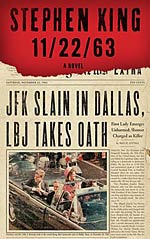
![]() verkisto
verkisto
7/26/2016
![]()
I'm a fan of Stephen King's from way back. I mean, I started getting into him when I was in high school, and that's now over 20 years ago for me. I've been one of his constant readers since then, and defended him to people who would try to tell me that he's a hack without any real talent, but even though I find something very familiar whenever I read his latest book, I also find myself being surprised by what I find in his stories. In this case, I found myself being intrigued by his deliberate sense of pacing. Like Under the Dome, the book is lengthy, and seems like it gets bogged down in tedious detail, but also like Under the Dome, if you try to go back and figure out what to cut out to make it less so, you'll find yourself at a loss as to what to cut. It's very conflicting, but when you look at those details, you find that a lot of the setting, characterization, and pacing is buried there, like a hidden message between the letters. And those three characteristics make up the bulk of what makes King's novels so readable.
The story is ostensibly about a man who travels back in time to prevent the Kennedy assassination, but really the story is about Jake Epping's post-divorce life. That his life takes him back to the late 1950s is just a plot device, as is the sense of responsibility he feels about preventing the assassination. Kennedy is just the framework to tell Jake's story, to the point where when King goes from Jake to Oswald, I found myself being a lot less interested in what was going on. This isn't a terrible surprise; King paints Jake out to be a very likable guy who's honest, dependable, and sincere (well, as much as anyone from the future could be while living in his past), and Lee Harvey Oswald has enough real history to make him the despicable character he really was. In fact, at first glance, it's very easy to look at Oswald as the antagonist of the story, but this isn't really the case. Jake is both the protagonist and the antagonist, as he's the guy who's gone back to try to change history, and also the guy who refuses to drop that responsibility to live the life he wants to live. It may sound like a grandiose comparison, but it reminds me of the decision that Jesus has to make at the end of The Last Temptation of Christ. And I wouldn't even consider Jake to be a Jesus figure in this story.
Something else I found pretty intriguing was the way that the novel had a couple of different stories written into the overall plot. I'm not even talking about subplots here, because the first 200+ pages of the novel were an experiment that Jake undertook to see how serious the consequences would be if he made such a drastic change to the timeline. It had its own beginning, its own middle, and its own end, and had the sorts of trials one would expect a character to have to overcome to be successful in the story. It helps explain how some of King's novels can wind up being so tremendous, and now I find myself wondering if he's done this in previous books and I just never noticed it. I certainly wouldn't be surprised.
Like any Stephen King book, 11/22/63 will reward faithful readers with interconnected places and characters that appear in King's other books. Years ago, I read an interview with James Cameron about Titanic, where he talked about using recurring extras in different scenes in the movie. They didn't have any speaking lines or serve any other purpose than to humanize the drama, but he chose to have them show up over and over again in different scenes to give a sense of familiarity to the viewers to give them more reason to sympathize with them. It worked pretty well, and I now realize that King does the same thing with his connected characters over all of his different books. They may not be the same characters, but they're related, and that gives the reader more reason to feel for them. In a way, it's still a little annoying, but I can't deny that it's effective.
Overall, I think this is a profound book. I'm not sure that I would call it standard King fare (the pacing and characterization will be familiar to his readers, but the theme is very different), but I found it to be very moving, thoughtful, and compelling. King still receives a lot of flack from literary folks for his success, as does Dan Brown, but while Dan Brown's writing skills fail when compared to his storytelling skills, King has them both, and I think much of the flack he receives is just jealousy. He manages to keep telling interesting, compelling stories without making them seem formulaic, and that's a damn sight better than what can be said for most popular authors these days. 11/22/63 isn't perfect, but it's an compelling, intriguing read, and the best book I've read this year.